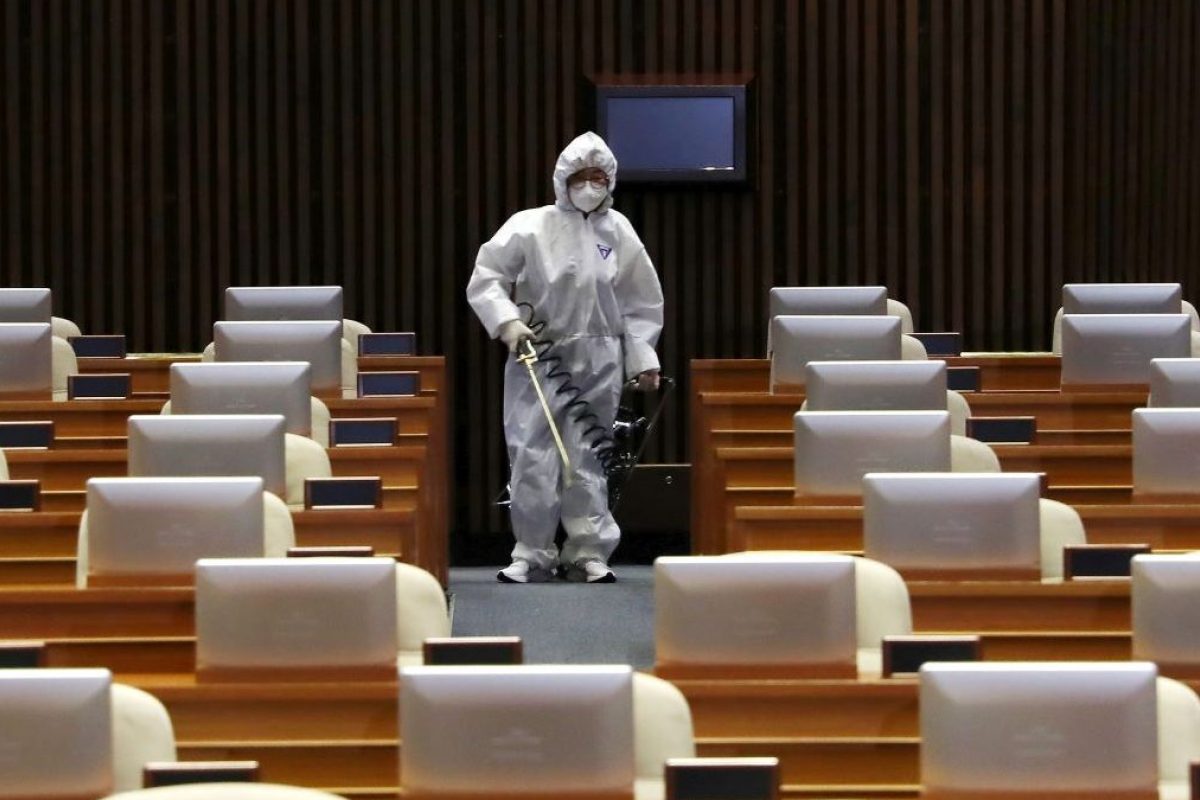On a day when 144 more confirmed cases of Covid-19 bought the national total to 977 and the United States warned against travel to South Korea, Seoul vowed extra spending to boost an economy reeling from the virus.
Finance Minister Hong Nam-ki revealed the government’s plan to use two trillion won’s (US$2.2 billion) worth of emergency funds, saying: “The government is making all-out efforts to come up with the first policy package that will strongly support economic damage and bolster slowing consumption, investment and exports.”
When it comes to bolstering consumption, the government is caught in a tricky bind.
Authorities are, on the one hand, calling for prudent human movement and many businesses, from educational institutions to coffee shops, are temporarily closing their doors – all of which suggest a boost in consumption will be problematic.
Beyond the emergency funds, a supplementary budget will also be required.
Lee Nak-yeon, a former prime minister and the head of the General Election Preparation Committee of the ruling Democratic Party, said on Tuesday in a meeting with ministers and presidential secretaries: “The necessary measures should be implemented promptly, and damage should be predicted so that the extra budget includes the cost of damage.”
Lee added that measures to support small business owners and the performing industry are necessary.
“We need to secure a supplementary budget in advance so that we can launch a nationwide campaign to boost consumption as soon as the situation is stabilized,” said the Democratic Party’s Floor Leader, Lee In-young.
He also called on the government to consider additional measures such as expanding tax deductions for using credit cards. While credit card use has long been promoted to increase transparency, credit card trails have also been used to backtrack the paths of those found to have Covid-19.
And in a third possible financial injection, the government and ruling party said they may also release yet more emergency financial funds, via presidential order, if the planned supplementary budget is not swiftly approved by the National Assembly.
With National Assembly elections set for April 15, the political climate is roiled.
Parliamentarians also suggested special measures to stabilize the supply of masks – which help to prevent infected persons infecting others – such as by halting their export.
“We hope that all domestic production of masks will be turned to domestic consumption and that all illegal activities such as hoarding and stockpiling will be tracked down,” Lee Hae-chan, the leader of the ruling party, suggested. “We hope that the administrative body will take extraordinary measures to help people get masks for free.”
Macro growth under threat
Prior to the coronavirus outbreak, there had been widespread hopes for economic growth in 2020 after a slow 2019, with the semiconductor industry – the cornerstone of Korean exports – expecting to see an upturn. But the dire situation in China is casting a widening shadow over the regional macroeconomy.
“As coronavirus infection is spreading in Korea, with a sharp decline in domestic demand, Korea’s exports are also forecast to be weaker due to the rapid slowdown in the Chinese economy,” Lee Sang-jae, an economist of Eugene Investment and Securities, wrote in a research report published on Monday. “Average daily imports dropped by 15.5% year-on-year for February 1-20 while daily exports fell 9.3% in the same period.”
The report added that domestic demand may be hit harder than exports in February.
Meanwhile, expectations for a policy rate cut are growing.
According to Reuters, 16 of 26 experts polled forecast the Monetary Policy Board of the Bank of Korea would cut the policy rate to a record low of 1.00% from the current rate of 1.25% on Thursday.
Quiet but no panic
While there is no apparent panic, there is considerable public concern. Seoul streets, while far from deserted, are quieter than usual, and numbers in businesses such as gyms and coffee shops are noticeably down.
In Daegu, the area hardest hit by the outbreak, public transport user numbers have plummeted and shopping districts have seen a plunge in foot traffic.
The public is deeply concerned about the spread of the virus by the secretive Shincheonji Church. As of Sunday, almost 70% of confirmed cases had been linked to the religious group, which suffered from a “super spreader” in its congregation.
In the face of massive public anger, the church handed over a list of about 215,000 believers, though the list does not include information on converts in training, the Joongang Ilbo newspaper reported. The Korea Center for Disease Control plans to conduct an investigation into the entire list of Shincheonji believers.






















